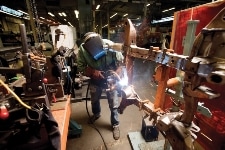How PwC can help you
For the Consumers and Industrial Products companies, PwC Macedonia offers a strong and reliable team of dedicated industry experts. Our client portfolio includes half of the 10 largest CIP companies in the country.
Our mission is to help clients extract value from their multinational operations, to develop a competitive advantage across the value chain, and to ensure that all corporate stakeholder expectations are recognised and met. Improving production techniques and identifying greater efficiencies in production processes and use of capital is the focus of our practice.
Ferrous and non-ferrous metallurgy
Due to its natural resources (nickel, silica, lead, zinc, precious metals), Macedonia has a long tradition in ferrous and non-ferrous metallurgy. A large number of facilities in the sectors of ferrous and non-ferrous metallurgy have been developed since the early XX century. Main products include ferro-nickel and ferro-silica alloys, hot and cold rolled sheet steel, seamed pipes, lead, zinc, copper, gold, and silver.
All the large facilities have been privatised during the 90’s, many of them sold to leading international players (Mittal, Duferco, IMM). Macedonian production is export oriented, especially the ferro-nickel and ferro-silica one.
Ferrous and non-ferrous metallurgy are respectively 11, 24% and 7.27% of the country’s industrial production volume index.


Machinery, automotive and electrical equipment industry
Industrial manufacturing sector has widely developed in Macedonia during the Yugoslavian period to include several producers of automotive components, a bus manufacturer, producers of electrical equipments and household appliances.
Recently however, a wave of foreign investments has led to the re-development of the automotive components sector with major players like Johnson Controls or Johnson Matthey, building large export-oriented production facilities. Also one of the major players of the motor vehicle industry is MZT Hepos AD Skopje whose main activity is production of brakes equipment for freight and passenger trains. In parallel, the recent years have witnessed a number of successful smaller local and foreign ventures in the electrical equipment, household appliances, wood and plastic processing industries, creating opportunities for further investment
Chemical industry
The country has a large chemical industry, which accounts for about 4.63% of its industrial output. There is a well-developed capacity for the production of basic chemicals, synthetic fibres, in addition to detergents, fertilizers, etc... Some of the largest companies however have not been privatised yet and suffer from the lack of investment during the last decade.
Pharmaceutical and cosmetics companies are also well established exporting throughout the region and beyond.


Textile industry
Like in many Eastern-European countries, this industry has become a major employer (branch employing the largest number of workers) and an important contributor to the GDP. Cotton thread and fabric, wool yarn, fabric and knitted fabric are the main products. This production is mostly export oriented.
Food and beverages industry
For centuries, Macedonia has a reputation for quality of its fruits and vegetables and it has developed a real expertise in the agro-food business.
Local companies produce, amongst other, canned fruits and vegetables, bottled juices and processed meat both for local market and export.The production of grapes and wine makes up between 17 and 20 per cent of the country’s GDP and there are over 70 wineries in Macedonia. Quality of Macedonian wine is recognised as one of the highest in the region and Macedonia exports are mostly towards Serbia with about 60% of total wine exports.
The prices annual rates for the 2010 Q2 are as the following: Food 1.1% and Tobacco and beverages 0.1%.
Tobacco growing and the cigarette production industry have been traditionally important sectors for the Macedonian economy thanks to the recognized quality of Macedonian tobacco. Tobacco processing has since long attracted foreign investment with major international players like Imperial Tobacco TKS having acquired cigarettes production facilities.


Retail distribution
Retail distribution is still a fragmented sector mostly dominated by small local companies but concentration is on-going and new larger players are expected to enter the market soon. . The percentage of the retail trade on the Macedonian market significantly differs from the percentage of the wholesale trade and that is shown trough the following indicators: Turnover percentage of the retail trade is 62,6 comparing to wholesale trade percentage which is 5,2%. Other indicator is also the employees structure, where it is shown that the percentage of the employees in the retail trade is 77,2, comparing to the percentage of the employees in the wholesale trade 4,3.
Construction and Building Material
Macedonia has a real expertise in construction. For decades, large Macedonian construction companies have completed large construction and civil engineering projects in the whole region. The percentage of the projects undertaken abroad of the Macedonian construction companies in 2009, is slightly increased compared to 2008. Construction activities in Macedonia in 2009 compared to 2008 are decreased due to the limited economic development over the past years, but perspectives are very positive and construction companies have now started stirring up the interest of large foreign investors. In the first quarter of 2010, the construction industry contributes 7.7 % of the country’s GDP.
There is a dynamic local construction material industry producing cement, tiles, sanitary ware, gypsum and associated products.


